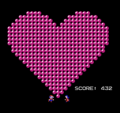Family BASIC
This article is under construction. Therefore, please excuse its informal appearance while it is being worked on. We hope to have it completed as soon as possible.
It has been requested that this article be rewritten. Reason: Add discontinued release date
- This article is about the accessory for the Family Computer. For the microgame in WarioWare, Inc.: Mega Microgame$!, see Family Basic.
Template:System-Infobox Family BASIC is an accessory for the Family Computer (Famicom) created by Hudson Soft, Nintendo, and Sharp Corporation.[1] It allowed users to create programs in the BASIC programming language, more specifically the NS-HuBASIC language which stands for Nintendo, Sharp, and Hudson Soft respectively. This accessory came with a specially designed cartridge and keyboard, similar in function to that of a Commodore computer of that era. There was also the Data Recorder peripheral which was sold separately. It was preceded by the nearly identical Playbox BASIC for the Sharp C1 Famicom TV. Family BASIC V3 was released on February 21, 1985 as a stand-alone cartridge.[2] This version came with pre-programmed mini-games.
The keyboard plugs into a 15-pin expansion port on the front of the Famicom and the Data Recorder plugs into the back of the keyboard labeled "SAVE" and "LOAD." If one does not have the Data Recorder or spare cassette tape (or finds cassette tape technology too inconvenient), one can just use the microphone and headphone jacks of a computer or similar device to record the analog signal coming from the keyboard with their preferred audio recording program and then play it back when the game is requesting data to be loaded.[3]
Three games are compatible with the Data Recorder:
Sprites
Many of the sprites and tilesets were taken directly from the Arcade Classics Series version of the Donkey Kong, Donkey Kong Jr., and Mario Bros. There are 16 animated sprites built-in. The following are the only sprites available for programmers:
- Mario - from his Mario Bros. design
- Lady - very similar to her Pinball design
- Fighter Fly
- Achilles - a bird, similar sprites are found in Hudson Soft's Famicom port of Binary Land and also Challenger
- Nitanita - a smiley face
- Penpen - a penguin from Pinball, this sprite will later be reused for Binary Land.
- Fireball - the variant from 100m of Donkey Kong, later reused for Challenger
- Car
- Spinner - a rotational symmetric space ship
- Star Killer - the bulkier space ship
- Starship - the space ship with nacelles
- Explosion effects
- Shellcreeper
- Sidestepper
- Nitpicker - the variant from Stage 4 of Donkey Kong Jr.
- Laser effects
It is possible to adjust the color of the sprites. The manual gives instructions on how to create Luigi or different colored enemies from the default sprites.
Programmable games in the manual
Before V3, there were no games available from the start. The manual gives instructions on how to create eight sample games.[4]
- Knight - each player controls a chess knight on a chess board. Any spot that has been landed upon becomes unavailable. The aim is to trap the opposing player.
- Super Memory - a memory game similar to Simon.
- UFO - a shooter where the player controls the Starship and faces off against a lone Fighter Fly that shoots back.
- Route 66 - an endless driving game
- Type Master - a typing game
- Turtle - horse betting but on Shellcreepers
- Card - a card matching game similar to N-Mark Spade Panel
- Sample program 8 - a turn-based chase game where Penpen has to grab flags while evading a Nitanita. The manual insists that this is not a game but a tech demo and leaves it unnamed.
V3 mini-games
Family BASIC V3 came with four mini-games:
- Game 0 "Heart": There is an outline of a heart that can be filled by speaking or breathing into microphone of controller 2. When done, Mario and Lady will come together.
- Game 1 "Penpen Maze": The player controls Penpen on a grid. The object is to collect numbers in order while avoiding two Sidesteppers. Penpen starts off with three traps that can temporarily stun the Sidesteppers.
- Game 2 "Mario World": Mario has to collect numbers sequentially and apples through a single screen of platforms, ladders, and springs while avoiding the two Nitanitas. However, collecting all the items does not end the game. The Time Limit will simply run out, forcing a Game Over.[5]
- Game 3 "Star Killer": This is an endless space shooter on a wraparound screen for 1 or 2 players controlling Star Killer and Starship respectively. Enemies include Spinners, Fighter Flies, Fireballs, and Achilleses.
Gallery
Names in other languages
- Family BASIC
| Language | Name | Meaning | Notes |
|---|---|---|---|
| Japanese | ファミリーベーシック[?] Famirī Bēshikku |
Family BASIC |
- Family BASIC V3
| Language | Name | Meaning | Notes |
|---|---|---|---|
| Japanese | ファミリーベーシックV3[?] Famirī Bēshikku Bui Surī |
Family BASIC V3 |
Trivia
- In the GBA game WarioWare Inc.: Mega Microgame$!, 9-Volt's microgame Family Basic includes the Family BASIC keyboard, where the objective is to type in the requested numbers or letters.
